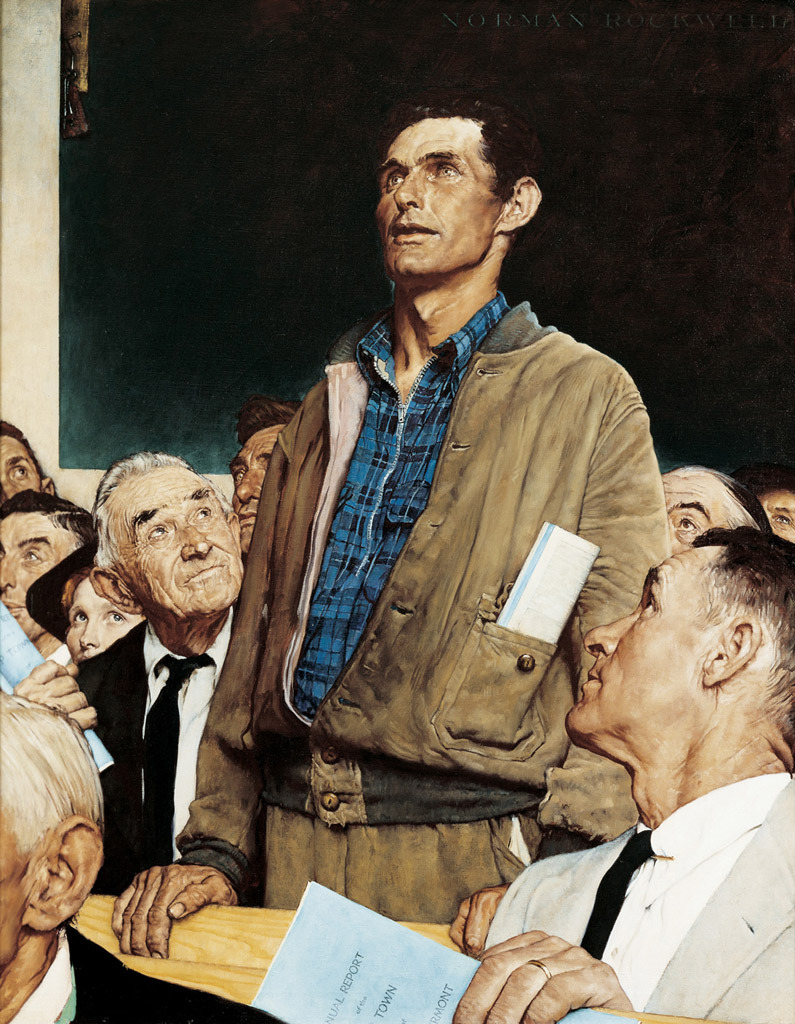This is your last chance to stop reading -- the last paragraph before I start pouring out the spoilers. In general, the series finale is one of those that at first seems to be "is that all?" and then the brain starts working on it, only to find that the finale is one of the best endings the show could have had. Conveniently, it's also one they could have sprung at any time. (Though, not sure if that's a weakness -- if you could have as many seasons as you want, do the episodes in between start becoming filler?)
#1) To anyone's POV traveling naturally forward in time, they see only one timeline. Like this:
#2) When you travel backward in time, you must travel backward along the branch you're on, which will then create a new branch. Going forward, you will live in this new branch. Like this:
#3) At first, that new branch will look a LOT like the original branch. It differs ONLY how YOU affect events. So, events will increasingly deviate.
#4) After time traveling, it is IMPOSSIBLE to return to the your original branch. It is gone. (No tethers allowed in this show.) It is also IMPOSSIBLE to influence, change, or otherwise affect anything in a different branch.
#4a) (Probably the saddest rule.) If you go back in time for the purposes of making changes, it helps ABSOLUTELY NO ONE in the original timeline. The original timeline will continue on. In terms of the show, the people in the original timeline are doomed no matter what you do in the new timeline you've created.
#5) When you go back in time, it creates another copy of EVERYTHING and EVERYONE. The original version of EVERYTHING stays on the original timeline, and the NEW copies stay on the new timeline. From everyone's POV, they all share the same histories (everything before the first black dot) and going forward, they will still experience only ONE timeline. For example, original Fred will end up at the second black circle in the picture above. And new Fred will end up at the red circle. Both Fred's will believe they live in their only existing timeline, and are completely oblivious of the existence of any other Fred.
#6) Very important to this show: If you go back in time while your original self exists, it will create another copy of YOU. The original copy, which we'll call U1, lives in the original timeline until it hits the second black dot, after which he goes back in time and lives on in the new branch (the red dot). The other copy of you, U2, branches off of U1 at the first black dot and will exist only in the new branch.
And get this: in the original (top) branch, there is only one copy of you: U1. And on the new branch, there are always two copies of you: U1 (your future self gone back in time) and U2 (your oblivious past self). Not only that -- U1 can meet U2 and do anything he wants. U1 can even kill U2 WITHOUT a PARADOX. The universe won't implode or any of that silly nonsense in the later seasons of Continuum and the 12 Monkeys TV show. It's perfectly okay, because U2 is a COPY, and not the original. He is an artifact you created when you went back in time. In order to create a paradox, you would have to be able to kill an earlier version of U1, which would require reentering the original branch, which is impossible (rule #4).
#6a) More pertinent to the show: What if you go back in time BEFORE your original self exists? One of two things happen. Possibility A = when you are born in the new branch, it's going to be a copy because things are different. Possibility B (much more likely) = you are never born in the new branch, because your changes were too severe, and your parents don't meet, or some other event causes someone else to be born. And this is PERFECTLY OKAY. Because you only need to exist in the original timeline. There is absolutely NO paradox.
#7) If one tries to go back in time again to make changes, it still fails in that timeline, as it will do nothing but create yet another branch. Your changes will only affect the new third branch.
#8) If you follow the rules above, it becomes nearly IMPOSSIBLE to have a paradox.
Okay -- you'll remember from watching the show that these facts become clear slowly as the plot progresses. At first, our protagonists believe there is just one timeline. They are told that if they succeed, they won't exist, and they'll just disappear (kind of like Back to the Future). But then travelers who come later start reporting different histories -- a new faction has arisen, and was always there. (I'll explain how that happens shortly, but you have enough clues from above to figure this out.) We don't get final confirmation of the time mechanics until Season 2 in the episode "17 Minutes" when we see several attempts of the Director trying to save the lives of 3468 and his team.
(And if you haven't watched the show, this really is your final warning, because here we go with the details...)
Here we go. Travelers adds one more kink into the mix. I'm not sure if it's necessary, but the idea is that once you send someone back OR if you send a messenger (both of which cause changes), then you can no longer send someone back or a messenger BEFORE the last action. Again, we see this like crazy in "17 Minutes." The first traveler arrives when the couple first jumps out of the plane. The second traveler gets there a few seconds later. And with each failure, the couple is getting dangerously closer to the ground -- a very cool source of tension.
Also, Travelers never shows anyone traveling (skipping) ahead in time. All skipping is backward, and all communication back to the Director must travel hundreds of years. Yeah -- mind-blowing stuffs.
So, let's see what these rules look like in our timeline pictures. We'll start with the original timeline where ABSOLUTELY NO TIME travel occurs for hundreds of years. Helios 685 hits the Earth, disaster ensues. The Director is created. They figure out how to transfer consciousnesses. They discover how to send those consciousness back in time. And then comes the first time travel attempt: 001 is sent back to September 11, 2001 -- one of the top floors in the WTC building -- a time in which they knew everyone was going to die. 001 then sends a message from a specific computer to a specific server, and then dies. But as we remember, he escapes and hides himself.
To understand the whole big picture (which believe me -- is about to go skewampus), we must pause here and look at the two timelines at this point. Right now the picture is what we've already seen:
Well, kind-of the same picture. It's hundreds of years in the future when 001 is sent back. So, his red dot would be much closer to the first black dot if drawn to scale. The first black dot is the morning of September 11, 2001 -- the exact moment 001's consciousness enters his new host.
Let's take a moment and look at the original timeline. What happens after 001 goes back in time? What do the future remaining people see? First, they see 001's consciousness leave, and his body becomes lifeless. And then ... well ... nothing. (Yeah, this is the sad thing we need to understand.) They are never going to receive the message that 001 sends in the past. That's because 001's message only exists in the new branch. It has no way to get to the original time line. Please take a moment to understand this, as it's key to understanding the awesomeness of the series finale. Once you see it, things will become clear.
(Addendum: if we use the full-fledged Many Worlds theory, it's feasible that another random version of 001 appears in this "original" timeline to deliver his message, but that wouldn't be the same 001. But adding in this kink just complicates the heck out of everything -- probability distributions and all kinds of craziness. So, for simplicity, we'll just forget that for now.)
Okay -- now let's look at the new timeline. Assuming 001 doesn't change too many things (just hide and do nothing), then the Director is still going to be created, and he WILL receive the message as planned. Perhaps 001 is sent back again, but he doesn't need to be, because he only needs to come from the original timeline. It should be clear that all of the show's timelines branch from this ONE new branch, and none of them branch from the original timeline. (Otherwise they would see a past in which 001 was not sent back in time.)
And get this ... in that new branch we see, there are absolutely NO MORE travelers. This is also very important in understanding the finale. This is because every SINGLE bit of information that goes back in time creates a new branch. This is logically equivalent to saying: every new branch has ONLY ONE change caused by time travel. So, in this new timeline, 001 is very happy. He stays hidden. He sees no other travelers. He thinks he's safe and dies happy. (Pure conjecture, but very feasible based on what we know about his character.) Please pause again to think about this fact: only ONE time-travel change per BRANCH.
Okay -- fast forward to the future of this new branch, and the Director is happy. He receives the message from 001 and decides to send 002. It's probably worth considering: that message had always been there on that specific server since 9/11/2001, waiting for someone to go looking for it. As soon as the Director came up with the idea, he could check immediately to see if the message was sent -- EVEN BEFORE SENDING 001 back. The Director may decide not to send 001 again, because it already happened. It's also possible that the "original" 001 doesn't even exist in the new timeline due to random ripples. In which case, the Director would have confirmation he was dealing with "Many Worlds" time travel. Either way, as an advanced AI, he would immediately use this information in its calculations. Maybe he sends 001 back. Maybe he doesn't.
Either way, 002 gets sent back. Let's pick a date: 12/25/2001. This will create a third branch, like this:
When 002 (who we never see) gets sent back, this is going to create another copy of 001. On that middle second branch, 001 never sees a traveler. But in the bottom third branch 001 could feasibly run into 002. Or maybe not. By now you should be able to see that there are going to be thousands of versions of 001 -- many of whom will be benign. But as soon as some versions of 001 see a whole bunch of other travelers coming, they're getting to be very paranoid and take matters into their own hands.
Before continuing on, we need to go back to that original timeline. That's where the Director doesn't get a message from 001. So, what does the Director do? Is he going to just quit and give up? I suppose that's an option. He'd most likely send another test subject. Some other 002, which would create another branch like here in blue:
This blue branch is interesting in that it doesn't have 001 in it at all. Can you imagine the show without 001? Well -- that would be the blue branch, and ALL OTHER branches that stem from the blue branch. Even though there can only be ONE time-travel change per branch, we can still have MULTIPLE time-travel attempts in any branch. It just means that we're quickly going to end up with spaghetti:
And yes -- in the original original timeline, the Director is going to get absolutely no messages or results from the past changes, because they're always going to happen in other branches. So, the Director in that timeline will likely eventually give up.
If you're still struggling with these concepts, just remember when Carly planned to kill Walt. It successfully got his mind overwritten, but then Philip saw the alternative timeline where both Carly and Walt died. You see ... the timeline where Carly and Walt died had to happen in order for the Director to see the need to overwrite Walt's consciousness.
And you know we aren't done yet. Get ready for major head-blow-age. I'm still recovering from what comes next.
3468 is sent back in time. We saw this happen in the first episode. They stopped Grant from falling into the elevator shaft, and 3468 took over Grant's consciousness.
Let's look at 3468's timeline before he's sent back. In that timeline, Grant had already died in the elevator shaft hundreds of years ago. So, when 3468 goes back in time, it creates a whole new branch. We could call this the 3468 Branch. If we were to keep watching this branch, it would be a very boring show, because following the rules above, we can only have one time-travel change per new branch. The version of 3468 in this branch sees no more new travelers coming. He'll likely die when Helios 685 hits the Earth. As far as this version will know, the Traveler Program will fail.
But in the show, we don't stay on the 3468 Branch for very long. As soon as the next messenger or Traveler 3469 is sent, it's a whole new branch. But then again, notice that we never really hear from 3469 in the show. (Also, evidently the travelers aren't always sent in numerical order.) Remember that blue branch we saw above where there was no 001? Well, it's very possible that in the timeline we follow in the show, it's a similar situation where 3469 was sent to another timeline. One version of 3468 might be able to meet 3649, but in the timeline we watch, the two travelers never meet. It seems clear that the "show writers" picked and chose a specific branch pathway for us to watch. Skipping some time-travel events, and allowing others to affect 3468.
But yet, we as watchers of the show don't see any of this picking and choosing. Rather, it seems to flow naturally -- like some one-true-timeline type of thing. It would look something like this in our spaghetti graph:
In this graph, 3468 gets sent back to the past, to create the original 3468 Branch. But then, other subsequent time-travel events create thousands of copies of 3468, and the show seems to take us to one random branch -- the one with a red dot.
And the big question is: What is so special about that branch? It looks no different than all the others.
The answer is way-wicked cool. Because it just so happens to be the one branch where the Director wins. We may have to let this set in. It's kind of like how lightning only occurs after random feelers reach out from the sky and the ground until one optimally efficient connection is made to choose the fastest random path for the lightning to travel.
Let's dig in deeper.
(First off, a quick disclaimer. Above, I have grossly simplified the rules so we can have a hope to grasp the whole spaghetti concept. But in doing so, I've introduced a conundrum: 3468 was sent in a team of 5 people, but as per the rules I laid out, they would each end up in 5 different timelines. If we allow for the full-fledged Many Worlds theory, there would thousands or millions of versions of 3468 and his team being sent to different random possible realities, and it would be very feasible that many versions of the team all appear together in the same reality (albeit each coming from slightly different future realities), much like how in Scalzi's "Old Man's War," each spaceship warp placed the ship in a different alternate universe much like the one they had left. Yeah -- my mind is not accepting all this right now. However, this all in no way nullifies the coolness of the series finale. In short, it's quite possible for a team to arrive at slightly different times AND still avoid all causality paradoxes.)
It's feasible that the Director tried different tactics to gain success, and we saw the only one that worked -- where he invokes Protocol Omega. The Director seemingly says, "Screw David and all of you. This Project is over." Yeah -- that was a fun heart-wrenching episode.
The problem was: 001 was just too much of a virus. The more activity the Director invoked, the more it increased 001's paranoia, which would then create the Faction in many branches. So much a virus, it was becoming impossible to find a branch not corrupted by 001.
Protocol Omega angers 3468, and inspires him to no longer live by the rules. Think outside the box. And yet, the Director seemed to know this was coming, as he provided a way for 3468 to do what he wanted to do: travel back in time before 001 arrived.
So, 3468 sent himself to where he knew Grant MacClaren would be a couple of decades ago -- right before meeting his wife. Then he was later able to send a message from the Twin Towers: Do not send 001.
And the Director got the message, starting the Traveler Program 2.0. And how cool was this ending? It took me an hour or so to think about it and realize what had really happened. Check out the spaghetti graph with this twist ending:
Remember that before 3468 made this last time jump, there was only one timeline until 2001, when 001 would arrive (the red dot). All the black lines coming out of the red dot represent all the millions and possibly billions of branches 001 corrupted.
The green dot seemingly random to the right represents the one branch where 3468 gets the idea to go back in time AND the Director seems wise enough to provide the tools for it to happen. Then 3468 goes back, ruining MacClaren's life much earlier (breaking the only-take-a-life-if-they're-about-to-die rules), and look at the new branch he creates in green.
It entirely CIRCUMVENTS ALL of 001's corruption.
As part of the Traveler Program 2.0, there are going to be again millions of branches branching off of that green branch, but with 001 out of the mix, it's more likely to succeed.
And get this: 001 still gets his win. He destroys thousands and millions of timelines. Millions of versions of him will think he's won.
Then it makes me wonder if the Director knew all along how to win. Perhaps he already knew the "Many Worlds" nature of time travel. During the whole show, we got to see the Director fail a hundred times. But to when, it takes only one success, and then something strange happens.
The branches in black above will ultimately die out because of their in-sustainability, even though those versions of the Director in that set will keep trying.
However, the branch in green will branch out into more successful outcomes. And with Many Worlds, the successful branches will continue growing in number: billions and trillions. So much so that by density, they'll greatly outnumber the 001 black branches, bringing the probability of 001 branches to practically zero.
So, in that respect the Director wins big time -- gets the last laugh. It ends up being a resounding success -- a type of natural selection that must eventually arise from such a random setup.
So, yeah. I'm quite impressed with this show's ending.
 Flipping Pennies: This one took a lot of work. I emulate bellwether counties by flipping 1000 pennies, and demonstrate math as to how much we can trust the predictive powers of these counties. Hint: turns out we can't!
Flipping Pennies: This one took a lot of work. I emulate bellwether counties by flipping 1000 pennies, and demonstrate math as to how much we can trust the predictive powers of these counties. Hint: turns out we can't! Two Amazing Experiences: A detailed account about my recent orchestral debut and trip to Carnegie Hall. Lots of fun and excitement!
Two Amazing Experiences: A detailed account about my recent orchestral debut and trip to Carnegie Hall. Lots of fun and excitement! Yes -- I'm Voting Democrat This Year: During a highly contentious election year, I explain why this conservative voted Democrat, and I make several predictions of what will happen should Trump become President, and explain why my conscious is clear. I also launched my Lunch Tracker to keep track of my predictions and see if I owe a lunch in four years.
Yes -- I'm Voting Democrat This Year: During a highly contentious election year, I explain why this conservative voted Democrat, and I make several predictions of what will happen should Trump become President, and explain why my conscious is clear. I also launched my Lunch Tracker to keep track of my predictions and see if I owe a lunch in four years. The Open House (The Adventures of Elder Elder and Elder Benjamin): My favorite of the missionary stories. The Elder's ward decides to host an Open House and fun shenanigans ensue.
The Open House (The Adventures of Elder Elder and Elder Benjamin): My favorite of the missionary stories. The Elder's ward decides to host an Open House and fun shenanigans ensue.



















